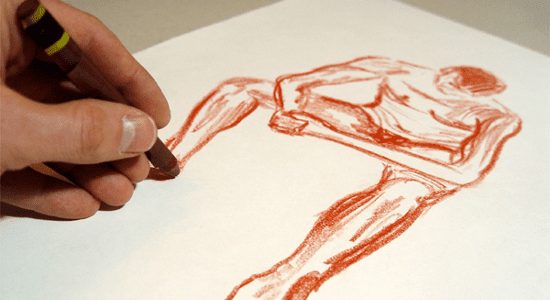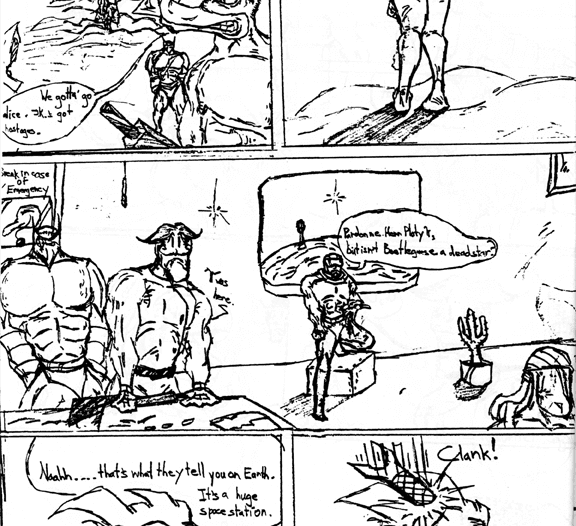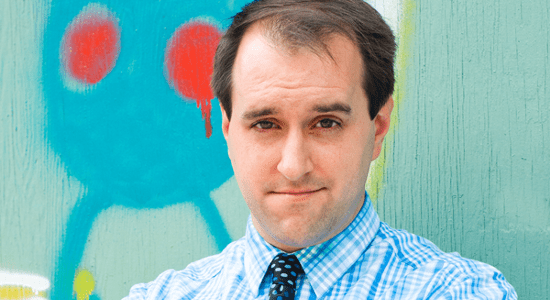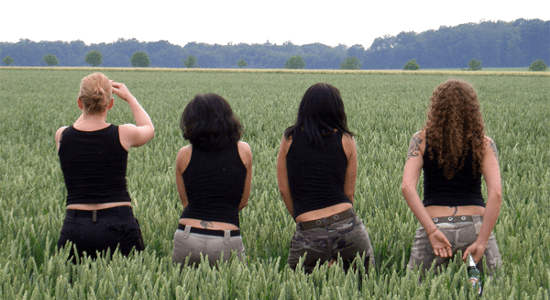Home is where the heart is A place where warmth and comfort can be A quiet place for just me Where I can be alone Even with everyone home Where I can eat all day and sleep all night Without anyone bothering me in sight Away from the world But still so close The world will always be an exciting place But home is where my heart is
Shorthand
Author of the Month: Kerri Sakamoto
Tell us about yourself.
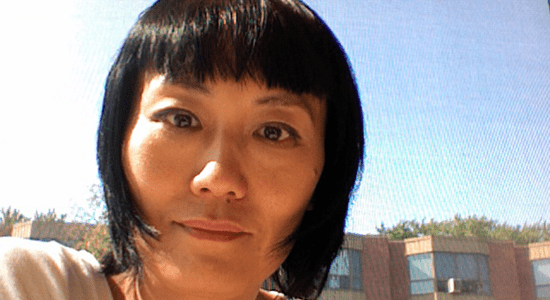
I am a writer living in Toronto with my family that includes a busy husband, Danito, a 17-year-old stepson, Eric, and a very busy 5-year-old son, Teo. I have written two novels: The Electrical Field and One Hundred Million Hearts, and am just finishing a third, as yet untitled. I call myself a late bloomer because that’s what I have been in all aspects of my life—but I also think of myself as a tortoise, who will slowly and finally and happily reach the finish line.
When did you realize you had a passion for writing?
It was in grade 3 when my teacher read one of my stories aloud on Parent/Teacher Night. My mom was very proud. It was about how we had made a sock doll together.
What pieces of writing/authors have had the greatest impact on you?
That would be Another Country by James Baldwin, which I read in high school. It was the first thing I’d ever read that articulated my amorphous thoughts and feelings about race and sexuality. I felt I’d found a special sheltering place from the racism that had been part of my life.
How and when do you find time to write?
I write during the day while my son is in school. I am very fortunate that I’m now able to stay at home and write. I try to write something “good” each day. I write until I feel I’ve achieved that, whether it’s a paragraph or two pages. Of course, the next day, it may not seem acceptable. But that keeps me going from one day to the next.
What has been some of the biggest challenges you’ve faced as a writer?
Self-criticism. Writing requires a leap of faith. There aren’t the usual validations as in conventional jobs, so you have to find ways to buoy yourself up. But the joy of writing keeps me going, and the faith in words to give form to feelings and ideas, to inspire compassion and empathy among readers.
How have you changed as a writer over the years?
Having a family changed me a lot. In the past, I could retreat into seclusion to write and my writing was very introspective. My globe-trotting husband and 5-year-old son pull me out to a wider, fuller world. The worlds I create have grown wider and fuller too.
Comic Descriptions
Find a comic book you really like, and select a page or two. Write what happens on the page (or pages) in plain text. Ask a fellow comic illustrator to do the same with a comic he or she likes. Now trade your written descriptions. Draw your friend’s description. This exercise, while it may seem fruitless, is perfect for improving your storytelling abilities. You’re interpreting someone else’s words. And what’s better, you can compare your work at the end to another version of that same written description. Not only will it serve as drawing practice, it forces you to analyze someone else’s drawing as well, so you can see how another artist solved the same drawing problems and handled the same material.
Captain Platy Pi and the Reality Splicers
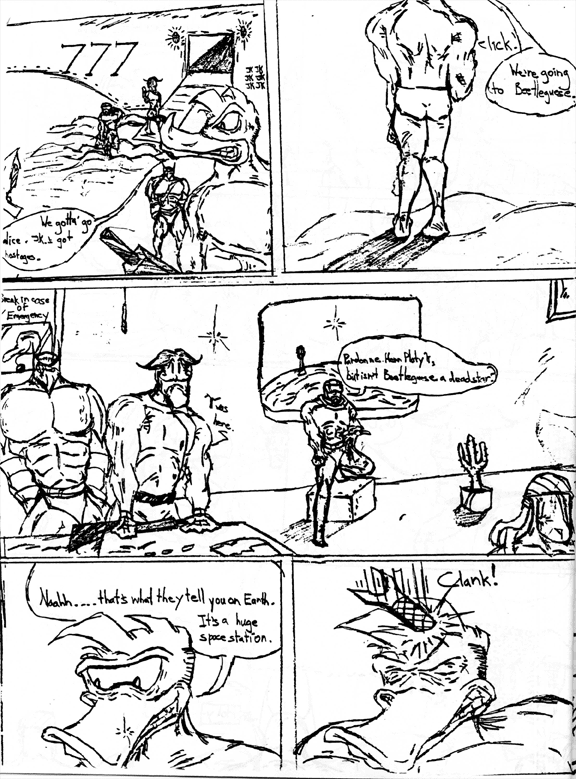
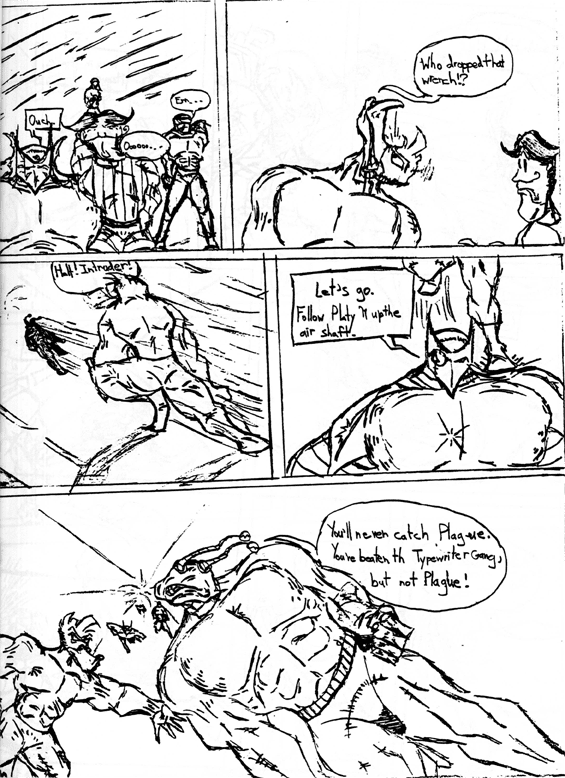
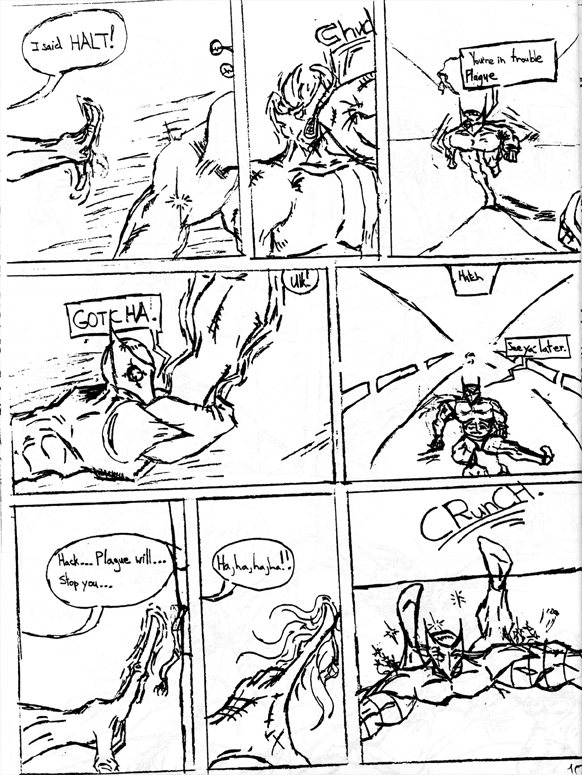
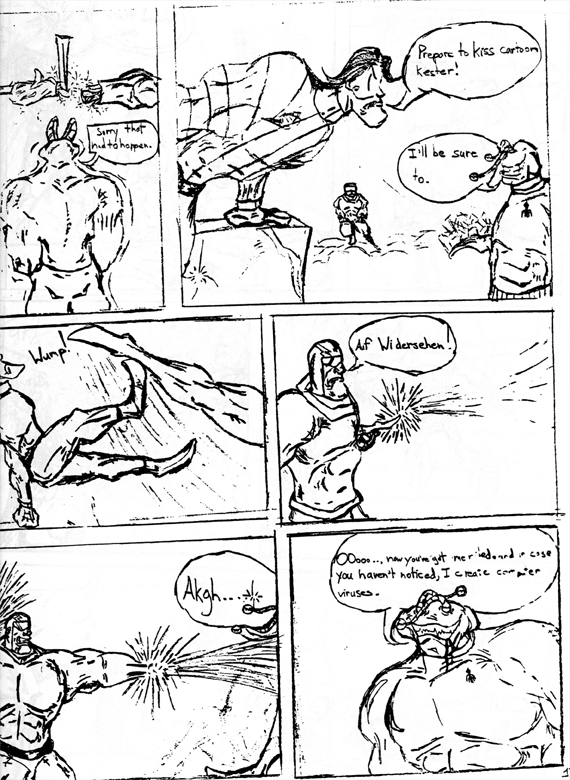
Author of the Month: Evan Munday
Tell us about yourself.
I am the publicist for Toronto-based publisher Coach House Books. I’m also the author of The Dead Kid Detective Agency, the first book in a juvenile fiction series published by ECW Press. I also make comic books, one of my ongoing projects is about a post-apocalyptic Toronto called Quarter-Life Crisis. And when I have some spare time, I watch only the finest terrible movies.
When did you realize you had a passion for writing?
I think I figured it out around seventh grade. In English class, we’d have to write sentences to demonstrate our understanding of vocabulary words. My sentences grew more elaborate and deranged (frankly) by the week. Eventually, they became full short stories, several pages long that incorporated the vocabulary words somewhere along the line. In retrospect, I wonder if my English teacher disliked me.
What pieces of writing/authors have had the greatest impact on you?
My comic book series Quarter-Life Crisis was hugely influenced by Bryan Lee O’Malley’s Scott Pilgrim series. I often describe the book as Scott Pilgrim meets Mad Max: succinct and accurate. And The Dead Kid Detective Agency has its roots in the children’s mystery novels of John Bellairs, James Robinson and Paul Smith’s short-lived comic series Leave it to Chance, and the television show Veronica Mars.
That said, I can’t figure out how some of my favourite authors and comic artists have influenced my work. Not in any discernible way anyway. I love Stephen Crane, Michael Chabon, Joe Meno, Kate Beaton—but can I see their work in my own? Not as clearly.
How and when do you find time to write?
I don’t know. If you have any suggestions, I’d love to hear them! I work full-time and as a book publicist, spend many evenings at book launches and readings, so when I write and draw, it’s usually very late at night or on the weekends. Occasionally, I can take a few days off in the winter or summer when the pace of book publicity slows down a bit. Evenings is usually when I write, though. I’m much more of a night person than a morning person, and I’ll sometimes pull all-nighters to finish work. I thought I’d be done with all-nighters after university, but I was very mistaken.
What have been some of the biggest challenges you’ve faced as a writer?
Time is one of the biggest challenges. Writing (or writing well) can take a long time; making comics, even more so. Finding the time to actually write and draw can be difficult, especially when, say, sleeping is so much more enjoyable. I’ve also found that whatever I do, I try to skirt the line between writing for children and writing for adults. My comic books are for adults, but there’s no real reason why kids wouldn’t enjoy them too (I hope). And my children’s novels are also written with adult readers in mind. But making novels or comics that are satisfying to both age groups can be a weird challenge, as you attempt to see how far you can push things without censoring yourself.
How have you changed as a writer over the years?
I used to write and make comics with a definite point or goal or theme in mind. The theme came first and everything I wrote was to help define and augment that point. Almost like writing an essay in the form of fiction. Gradually, that’s changed, so that I now just try to write a good story. After a couple drafts, I then figure out what themes I’ve been grappling with (subconsciously) and work to pull them out a bit. With the second book of Quarter-Life Crisis (which I’m currently working on), there was about a year between first writing the script and me figuring out what idea the story was engaging in.
Sisters Always
For as long as I can remember I’ve always wanted sisters or even just a sister, singular, but never had one because of circumstances clearly beyond my control. I’m uncertain of the origin of this desire since I had a full childhood and a fun brother, but nevertheless, I’ve always wanted, nay, desperately dreamed of how great having a sister would be.
There were four of us in high school who were really close best friends and we all referred to each other as sisters. We would sign birthday cards with love, your sister so-and-so and we even had silver rings engraved with Sisters Always, when we were still young enough for that kind of thing to be sweet. However, we all eventually lost or broke the rings. Plus, at different points each of us began to choose deadbeat boyfriends over each other, damaging our relationships in ways that made us start to resent each other instead of unconditionally loving each other, which by the definition I go by, is what being a real sister is all about.
The demise of the jewelry could be considered a foreshadowing of the fate of our sisterly relationships with each other, because I’ve since cut my losses in that department with them. I still love them as friends, just not quite like sisters. Sisters! Even the word fills me with longing. Staying up cross-legged on each others’ beds too late on a Tuesday. Fighting to the death over who gets the pancake with the most chocolate chips!
I’m over it.
So when I met Sara through a mutual friend and we decided to get an apartment together at the end of the summer, because neither of us could afford living on our own, in the back of my mind I thought maybe, just maybe, we would grow to have the type of sisterly relationship that didn’t need the affirmation of matching ring engravings.
After all, we had all the makings of a sisterhood because of all the things we had in common. We looked like each other because we are both Dutch, although she is a bit more so because she was born over there, whereas I am representative by last name and gene expression only. We both liked the same kind of films (Spanish stuff and whatever Audrey did) and we even slept with the same guy, although at different times, which was a small factoid we discovered one night after a few whiskey-waters and half a pack of cigarettes. Perfect!
Not long after we moved in, however, I found out a bit of information that essentially ruined everything. Sara already had five sisters. Five. I didn’t know that was even possible.
Of all the things in life she needed, or perhaps didn’t need but wanted, a sister was not one of them. I didn’t even have to ask to know that for sure.
Sara was the youngest of her sisters, Geertje, Doutzin, twins Yopi and Jacoba, and Roos. This made things worse for me because Dutch names are impossible to pronounce, punctuating not only my longing for a sister, but also my cultural shame for not being able to speak the language and so, by default, throwing out my ancestry in the garbage dump of life.
I was always relieved when Roos called because hers was the only name I could pronounce with confidence, as it had only one syllable. Every time she called, I would make a big fanfare of it, going all “Hey Sar” – which is what I call Sara—“Hey Sar, Roos is on the phone!” She’d be all like, “What?!” and I’d go: “Roos. Roos. ROOOOS!”
I had to stop that after a while though, because I didn’t want either of them to get the idea that I liked Roos in a romantic way, which would have been a perfectly reasonable deduction considering all the fuss I made every time she called.
In any case, I had to essentially accept that Sara and I were never really going to be sisters, since bottom line was she had so many already.
I moved on.
Eventually, October rolled around, which meant that Thanksgiving was upcoming and since my family lives far from the city, it was looking like it would be a solo holiday for me.
Then one morning, I was frying Sara and I some delicious eggs while she struggled with the notoriously stiff plunger of the French press in the kitchen.
“Oh, I forgot to ask you! Thanksgiving! You should totally come to my family’s house with me.”
My ears felt hot, but I played it cool.
“Yeah, totally, I’m there.” I flipped the eggs really high, which is a neat trick I can do.
“What should I bring?”
The eggs landed perfectly on the inner rim of the pan and slid to rest in the centre. Still got it.
“Oh please! Just come.”
Sara scratched an itch on her upper lip and left a smear of wet coffee grounds right across her face that looked like a huge moustache. I turned her around so she could see her reflection in the microwave. We both laughed our heads off.
I was really good about not getting my hopes up, but still, Thanksgiving was shaping up to be amazing.
When we arrived and I saw her whole family with all those sisters for the first time, it really hit me how many of them there really were.
It turned out that the twin sisters, Yopi and Jacoba, were both not only expecting babies, but were both in the same term of pregnancy which was quite a sight, if you can imagine. They were like twin planets orbiting around everyone in the living room, or we were the ones orbiting around them. It was hard to tell.
Geertje, the eldest, was definitely the most hardcore because she rode a motorcycle to the party and consequently owned and wore a disproportionate amount of leather from the rest of the family. Also, she had a tattoo of a bird of prey on her forearm.
Doutzin, the artsy one, was projected live from her apartment in Antwerp on the TV all day via some internet feed, which I found very futuristic although everyone else thought it was normal.
And then there was Roos.
Roos is the black sheep of Sara’s family, which I didn’t realize until I saw them all in a room together and Roos was the one in the corner with her shoulders hunched, wearing an exaggerated frown.
All six sisters, Sara included, were tall and beautiful with green eyes and sandy blonde hair just like both their mother and father. My Nan used to say: “When a man has multiple beautiful daughters it means he must have screwed over a lot of women in a previous life.”
Not that I believe that, I’m just saying.
After the rest of their extended family arrived, card tables were stacked end to end starting from the kitchen and making its way down the hall and into the living room. Some of the small kids had to share chairs and the cranberry sauce was kept in a container with a lid so we could launch it like a football down the table to whoever needed it. I sat next to Sara, obviously, although Roos seemed a little irritated about getting bumped one seat down and refused to pass the salt to anyone in protest.
The dinner, itself, surprisingly was fairly uneventful despite the arrangement. The exception of course was Sara’s aunt Helen, who fully farted during grace. Cousin Katie took her home before pie, though, because she was hammered and had fallen asleep. This was disappointing, as one could imagine. She was hilarious.
All throughout dinner, Sara tried to explain who was related to whom, how, and what each person was famous in the family for. It was impossible to remember but entirely rapturous. The joy I felt from the great time we were having made it very difficult to suppress my feelings of wanting to be sisters.
Then, I had a sort of devilish idea. One, that now I’m almost ashamed to admit. What if I lured one of the sisters away from the pack and maybe, just maybe, replaced her? Perhaps we could be sisters after all.
I remembered Roos.
When we finished up dinner, we folded all the tables up and arranged the chairs around the living room.
Since Sara’s family is so large, they have all kinds of traditions when they all get together on holidays. Although I’m not normally an advocate of forced fun, I’d had enough wine by the time the cards, boards and eggs on spoons emerged.
We had a vote for what we’d play.
Judging by her all-performance fleece vest and tight ponytail, Roos was definitely the sporty type and not the artistically inclined type who would excel at a game like the drawing-based Pictionary.
I put my hand way up for Pictionary.
My vote tipped the scales, so Geertje hauled out the chalkboard easel and the coloured chalks. The twins handed out cocktail napkins with little wieners on them, while Sara’s mother put bowls of licorice on the table. Sara’s balding uncle, who was a bit grabby with me earlier, sat down next to me. I made a smooth exit for the punch bowl.
When we all finally congregated in the same room, they asked Roos to host the game.
“Never!” she snapped, recoiling into her turtleneck sweater, so Doutzin took the helm via satellite. We split into two teams of six.
Tempers quickly escalated as they tend to do during Pictionary because of the disparities inherent in the game itself. For instance, one team will get moonwalk and the next team will get Suez Canal. It sucks, but that’s Pictionary.
We played several rounds until our teams were tied and it was Roos’ turn.
“If you win this clue, your team wins the game, sweetie,” her father reminded the whole room.
Roos looked terrified.
She pulled her card and tears started to cloud her eyes, but the family would have none of it. They all cheered her on. The timer started and Roos was stuck up there doodling blobs and trembling.
“House of cards! Trains! Train STATIONS! Bobsled Teams! Jamaica!”
Her team was totally lost, understandably so, because her picture was terrible. But then suddenly, it occurred to me what the lopsided box and swirly doodles were.
Roos’ clue was soap dish.
I looked up at Roos, humiliated, drawing circle after circle, around and around and I started to feel guilty for causing her to be in that position in the first place. Truthfully, she was as sad a soul as I was, just in a different way.
My conscience was in crisis. I realized it wasn’t fair of me to remain silent, even if we weren’t on the same team. So I leaned over and was about to whisper the answer to her cousin, so that she would be saved from her misery. But, just as I was about to speak, my tongue jumped back down my throat and refused to budge.
Roos had won in the game of life up to that point, and it looked like even if rationally I wanted to do the right thing, I was going to cross my hands quietly in my lap instead.
The last grains of sand slipped through the red plastic hourglass and a cacophony of cheers and groans filled the room. Roos’ demise was complete.
Sara’s family’s rules stated that the next team could go for the steal.
“Okay,” Doutzin piped in from the TV screen, “next team?”
“Soap dish!” I shouted.
“Yes . . . ” Roos groaned.
A cacophony of cheers and groans again filled the room.
“Maybe you and Roos here were swapped at birth.”
Geertje held her fist up to tap mine.
I stole a glance at Roos who was shooting eye darts at my head.
The family was too busy clinking glasses in celebration or arguing over the points to notice her slinking out of the room, dragging a greasy butter knife along the wallpaper leaving a huge long mark. Totally weird.
I thought about going after Roos to smooth things over, but then I had visions of her stringing me up and bludgeoning me with a dirty shovel. I decided against it.
By the end of the day, I was absolutely exhausted. As the last of the family trickled out the front door, Sara and I were faced with a kitchen of dishes, followed by the twin-sister planets who each needed help being lowered into and out of their individual baths because their joints were swollen and puffy. Roos was supposed to help, but she was nowhere to be found.
I made a joke about installing the harnesses they use to lower boats in and out of marinas into the bathroom, but neither pregnant sister found it very funny.
“Pass the cucumber face mask,” Yopi sneered.
When we finally got home, I threw myself face first onto my bed and stayed like that with my shoes still on. For the first time since I could remember: the thing I wanted more than anything—even a sister—was to be completely alone in full peace and quiet.
“Wait, don’t fall asleep yet!” Sara pleaded. “Let’s just hang out for a few minutes.”
I gave her my best you’re killing me with a hundred daggers look, but she ignored it.
“Come on, I’ll make tea and we can sit on my bed and smoke out the window.”
I slowly got up off the bed and yawned in the most exaggerated way I could without triggering my lock-jaw.
“Today was fun, thank you so much for inviting me.” I gave her two genuine thumbs up.
“It was,” she agreed, “Come on, just five minutes.”
“I’ll give you something far better than five minutes,” I yawned again.
“What?”
I hugged her and gave her two solid back taps.
“That was it.”
“What?”
“G’night.”
I gently pushed her out of my room and closed and locked the door behind her.
I gathered all my pillows together, curled up and slept like a baby until morning.


